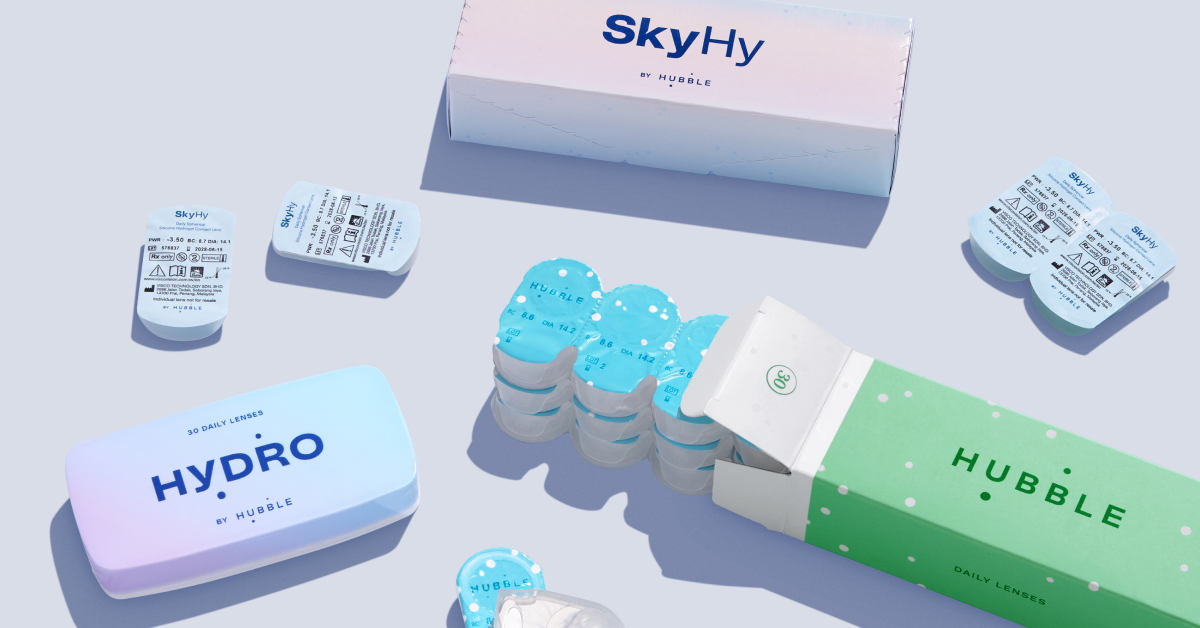Can You Use Eye Drops With Contacts?
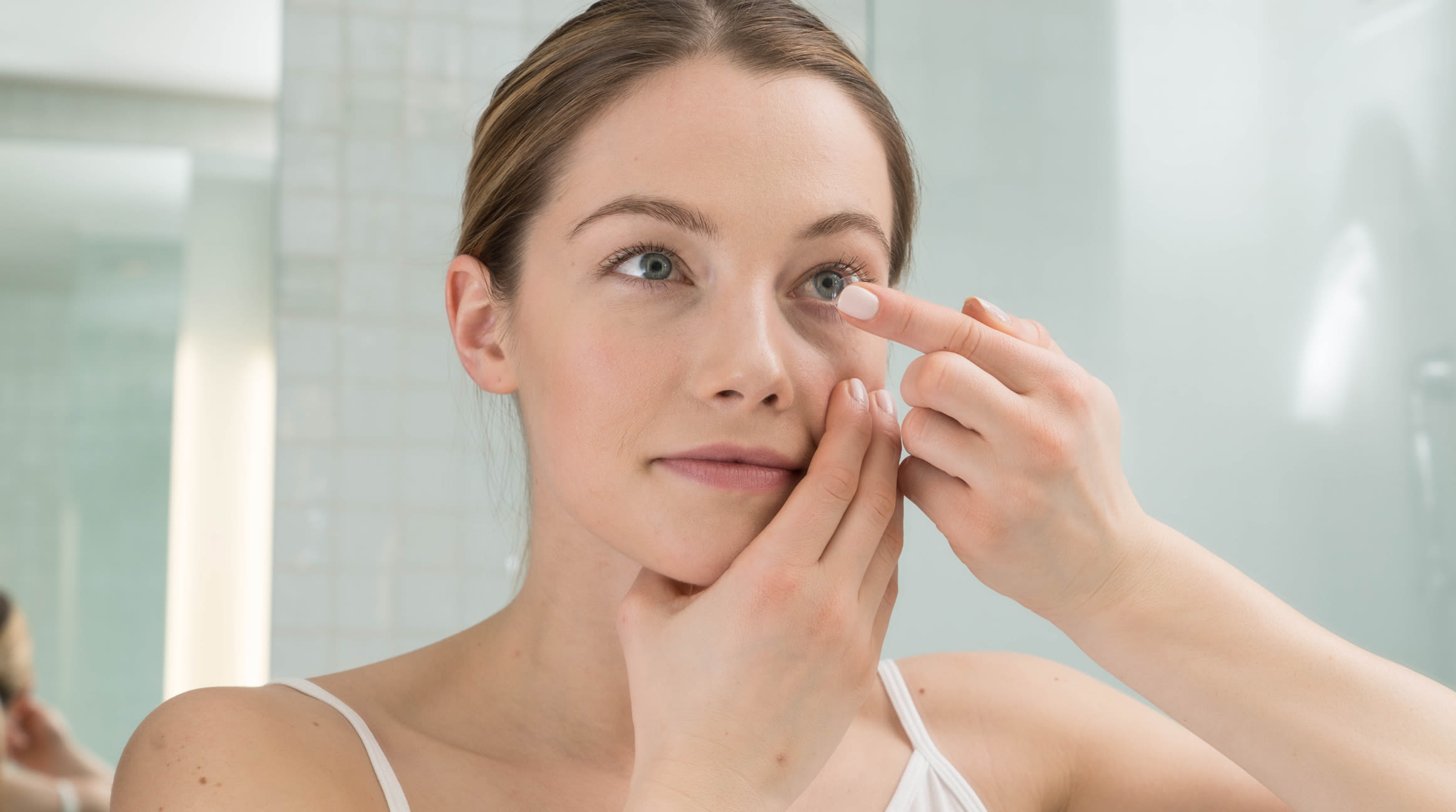
Eye drops can be a source of relief for many. There are numerous types of eye drops —some available over-the-counter—that treat dry eyes, allergies, redness, and more.
Contact lens wearers aren’t immune to these issues—in fact, contacts may even cause dry eyes or redness in certain cases. Before reaching for a bottle of eye drops, you may be wondering if you can put in eye drops with contacts? Let’s dive into everything you need to know about using eye drops with contacts.
Can I Put in Eye Drops With Contacts?
In general, yes, you can use eye drops as a contact lens wearer. However, there’s no one-size-fits-all answer to whether you can use eye drops with contacts. As a best practice, you should never use eye drops while wearing contacts without first consulting with your eye care professional. Some eye drops will cause issues with contacts, so it’s important to get clarity before using them—especially over-the-counter eye drops.
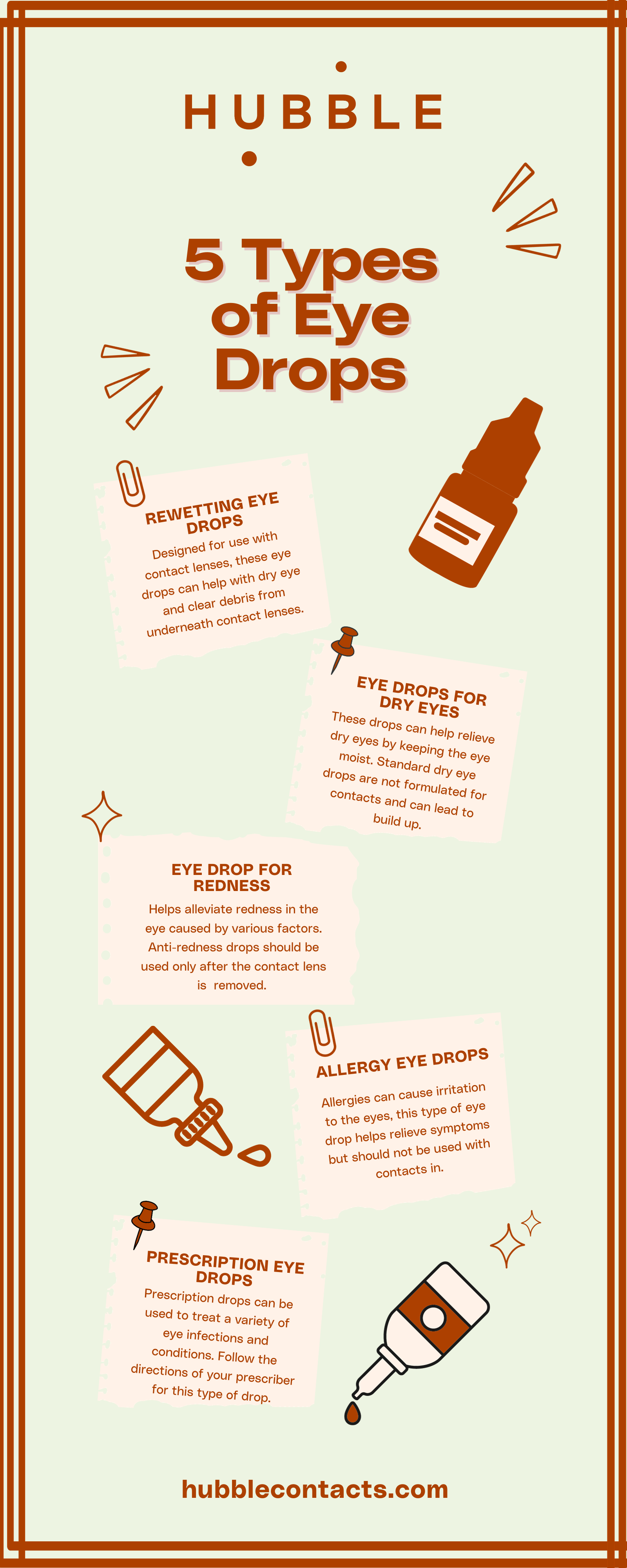
Only your eye care professional can tell you whether the specific eye drops you have are suitable for use with contacts. Consider booking an appointment and bringing the bottle with you—otherwise, a call may suffice if you’re looking for a quicker answer.
Types of Eye Drops
There are a variety of different types of eye drops available, each with their own purpose. While you should always discuss with an eye care professional first, there are a few general tips for each type of eye drops as it relates to contact lenses. Let’s take a look at some of the most common.
Rewetting Eye Drops
Some contacts—especially those worn for two weeks or longer—can lead to dry eyes. Taking the lenses out and rewetting with contact lens solution may take care of the issue, but if you’re on the go, it’s not always a practical option. That’s where rewetting eye drops come in.
Unlike other types of eye drops, rewetting drops are designed specifically for use with contact lenses. The drops lubricate the eye and the lens, making for a more comfortable experience. They can also clean out debris or buildup from underneath the lens.
Your eye care professional can recommend the best rewetting drops to use with your lenses—however, it’s generally best to use the same brand of rewetting drops and contact solution when possible. These eye drops are available over-the-counter and can be found by the contact solution. The box will always say “for use with contact lenses,” which differentiates them from the next type of eye drops.
If you experience symptoms of dry eyes, your eye care professional may recommend using daily disposable contact lenses. These lenses are designed for one-time use, meaning you wear them once and then discard them. The advantage of single-use contacts is that they are less likely to accumulate protein deposits, potentially reducing irritation and dryness. Additionally, the convenience of wearing a fresh pair of contacts every day minimizes the time and effort required for lens maintenance.
At Hubble, our range of contact lenses are formulated for hydration and breathability The material and shape of our Hydro Contacts are specially designed to retain moisture on the lens surface, and our most breathable contact lenses, SkyHy by Hubble, features cutting-edge silicone hydrogel material allows oxygen to move through the lens for fresh eyes all day.
Eye Drops For Dry Eyes
While rewetting drops are specifically designed for contact lenses, there are a variety of other eye drops that target dry eyes as well. Standard eye drops for dry eyes, however, are not formulated for use with contacts. In fact, they can often cause issues when used with contacts. Many of these types of eye drops are thick and contain oils that can lead to your contact lenses clouding up. This can also cause additional buildup on the lens that may lead to more issues and a shorter lens lifespan.
If you’re routinely experiencing dry eyes while wearing contacts, contact your eye care professional to discuss your options. It may be the lenses themselves causing an issue—and if not, your doctor can recommend rewetting drops to work into your routine.
Eye Drops for Redness
Eye redness can stem from a variety of factors including illness, injury, allergies, or even contact lenses. There are a number of eye drops available over-the-counter that are designed to reduce redness—but like drops for dry eyes, you should steer clear if you’re wearing contacts.
These eye drops can also cause cloudiness due to deposits building up on the surface of the lens. In general, it’s best to avoid these drops until after you’ve removed your lenses.
Did you know that Hubble offers a wide range of eye care accessories, including redness-relieving eye drops? Lumify Drops from Bausch + Lomb are the #1 Eye Doctor Recommended, and their breakthrough, clinically-tested formula uses low-dose brimonidine tartrate to relieve redness that lasts up to eight hours. Lumify drops, like all of our eye care accessories, always ship free.
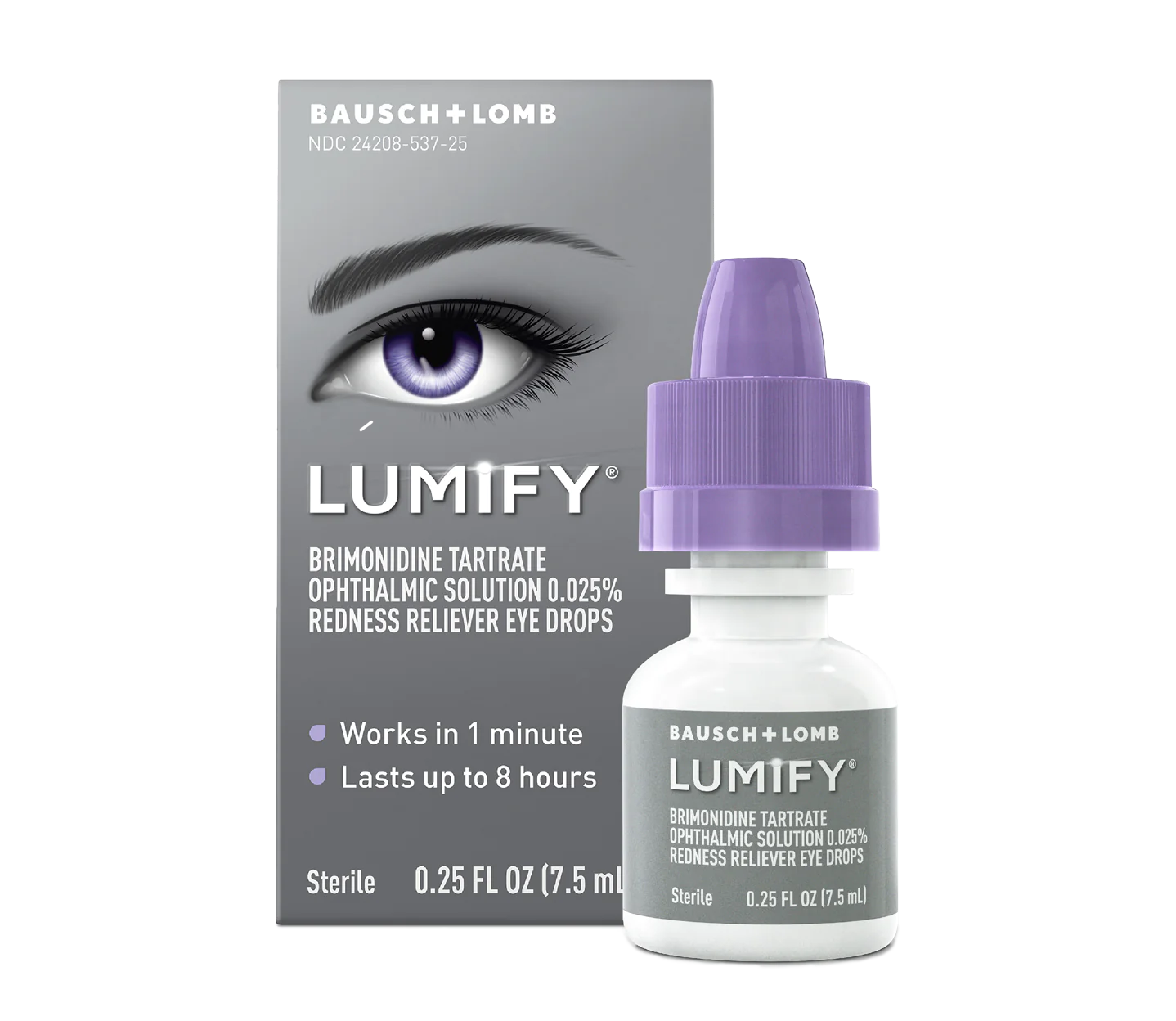
Prescription Eye Drops
In general, prescription eye drops used to treat eye infections and other eye conditions should not be used with contacts. In many cases, it may be recommended not to wear contacts at all until the condition is cleared up. Be sure to follow all instructions provided by your doctor and pharmacy to ensure these eye drops are used properly.
Can You Use Allergy Eye Drops with Contacts?
When it comes to managing allergies while wearing contact lenses, many individuals wonder about the safety and effectiveness of using allergy eye drops. Unfortunately, wearing contacts can exacerbate symptoms as lenses can be magnets for common irritants such as pollen. Allergies can cause uncomfortable symptoms like itchy, watery, or red eyes, which can be particularly challenging for those who wear contacts.
Typically, allergy eye drops are formulated to alleviate these symptoms, but their compatibility with contact lenses can vary. It's crucial for contact lens wearers to understand that not all allergy eye drops are suitable for use with their lenses. Some formulations may contain ingredients that could adhere to the lenses, potentially causing discomfort or even affecting vision clarity.
Before using any allergy eye drops, it's essential to consult with an eye care professional. They can provide guidance on which eye drops are safe to use with your contact lenses and might recommend specific brands or types.
In some cases, they may advise you to remove your lenses before applying the drops and wait for a certain period before reinserting them. This precaution helps to ensure that the eye drops do not interact negatively with the contact lenses or cause any additional eye irritation.
Wearing Contacts with Allergies
For individuals who frequently suffer from seasonal allergies, eye care professionals suggest opting for single-use soft contact lenses rather than those intended for multiple days of use. Switching to a fresh pair of lenses every day can help reduce the accumulation of debris, which often aggravates allergy-related symptoms.
Allergy Drops for Contacts
Antihistamine eye drops are specially formulated to provide itch and allergy relief to your eyes. Unlike typical eye drops, these treatments contain an antihistamine that targets histamine, a chemical the immune system releases. Histamine is known for triggering allergic reactions affecting the eyes, nose, and skin.
If you’re in the market for these drops, Alaway, available from Hubble, is the first and only FDA-approved, over-the-counter, preservative-free, antihistamine eye drop. It works in minutes, lasts for up to 12 hours and ships free.
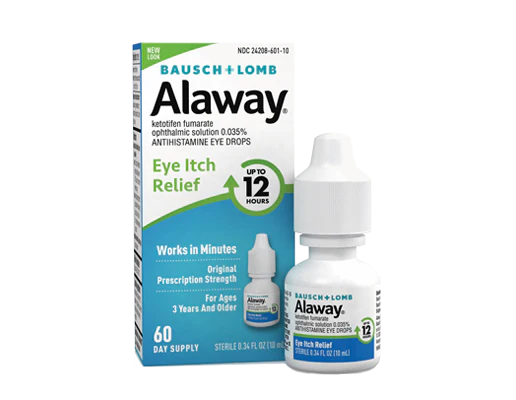
Antihistamine eye drops are usually safe for use with both hard and soft types of contact lenses. Keep in mind that it is best practice to administer the drops at least 15 minutes before inserting your contact lenses. This timing allows the eyes to absorb the medication more effectively, rather than the lenses absorbing it.
Remember to Aaways adhere to the usage instructions included with any prescription or over-the-counter product. Avoid using the drops beyond their recommended usage or expiration date. A good general practice is to discard the eye drops no more than three months after opening them.
Can I Use Contact Solution as Eye Drops?
No, you should never use your contact lens solution as eye drops. For contact lens wearers with bi-weekly, monthly, or other contacts that require daily contact lens care, it may be tempting to try to alleviate dry eyes with a few drops of contact solution in lieu of eye drops. However, contact solution is not intended to be used directly in the eye—in fact, doing so may actually harm the eye. If your eyes are feeling dry or irritated with contacts in, it’s best to remove the lenses, clean them with solution, and soak them in a contact lens case until the dryness or irritation has subsided.
As an alternative method dry eye sufferers might invest in a product like Biotrue Hydration Plus Contact Lens Solution, a solution specially formulated to boost moisture to your contacts for up to 20 hours. This solution in particular is enhanced with an electrolyte, an antioxidant, and 25% more hyaluronan (HA)
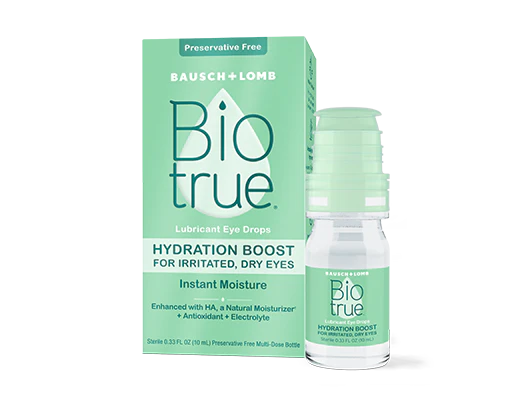
Should I Take My Contacts Out?
If you’re considering using eye drops while wearing contacts, you’re likely experiencing dry eyes, eye redness, or irritation. However, rather than treating these symptoms, it may be time to take your contacts out.
The CDC recommends removing your contacts if you’re experiencing any of the following:
Eye redness or irritation
Pain in or around eyes
Sensitivity to light
Blurred vision
Unusually watery eyes
Eye discharge
These may be signs of a potentially serious issue such as injury or eye infection. If removing your contacts doesn’t alleviate the symptoms, contact your eye care professional as soon as possible.
Eye Drops and Contacts: Try Daily Contacts from Hubble
Some types of contacts can lead to the symptoms that you may want to use eye drops for, including dry eyes or redness. However, daily contacts can help avoid these issues. Being that a new pair is used each day, daily contacts ensure that each pair of lenses is fresh and free of deposits that may affect lens performance or cause eyes to dry out.
If you’re ready to get the most out of your contact lenses, check out daily contacts from Hubble. Hubble daily contacts are designed with convenience and performance in mind—each day you get the benefit of a fresh pair of lenses. Don’t just take our word for it—start your subscription for as little as $1 today.
